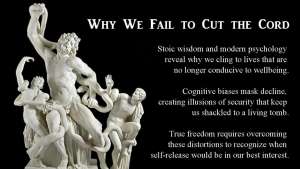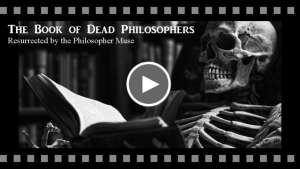Publicaciones

Why We Fail to Cut the Cord to Life
“The wise man will live as long as he ought, not as long as he can… He always reflects concerning the quality, and not the quantity, of his life.” — Lucius Annaeus Seneca While Stoic philosophy invites us to confront mortality with clarity and equanimity, modern psychology helps explain why many people cling to lives

Give Me Hemlock and a Steady Hand
“Less you drink of my cup you are not worthy of my wine. No man can be brave as he walks thro’ the passage of time; if unable to lay down his life for the best in mankind.” Meletus may have demanded the death penalty, but it was Socrates who forced the hand of the

Embracing Death with Dignity | The Philosopher’s Descent
“Death is a decaying bridge no man would cross of his own accord; unless he has made himself ready by embracing his two-edged sword. He casts aside the looming shadows his grasping heart conceives, and finds himself alone at last, from whence emerged his crimson eve.” – Philosopher Muse (An invitation to the Trial and

The Forced Violence Paradox | North America’s Ethical Crisis
The philosophical case for recognizing voluntary death as an expression of individual autonomy has gained traction in recent years. This momentum is exemplified by the 2020 decision of the German Federal Constitutional Court, which affirmed the right to self-determined death as a core aspect of human dignity (German Federal Constitutional Court, 26 February 2020). Thomas

The Book of Dead Philosophers (Revived)
I was a news broadcaster in my college years. My job was to search out and share local, national, and international pieces. I would watch CBC News to get ready. Peter Mansbridge was my go-to. His deep, confident voice felt like the bedrock of Canadian society. Yet even the greats would make mistakes.—Over time, I

Undoing Suicidism | Rethinking Suicide Prevention
“Think how long you have been doing the same thing over and over: food, sleep, sex, round and round in a circle. It is not only the sensible person, the brave person, and the miserable person who can conceive a wish to die: sheer disgust may wish for it as well.” – Seneca, Letters on
